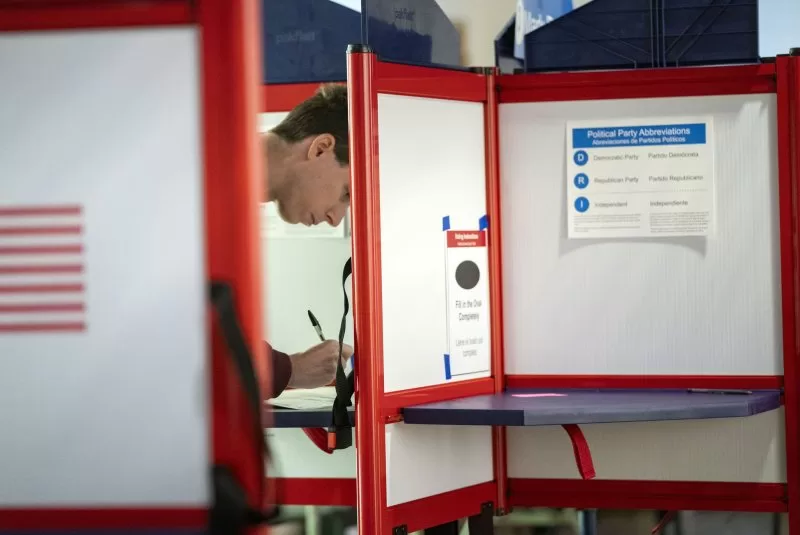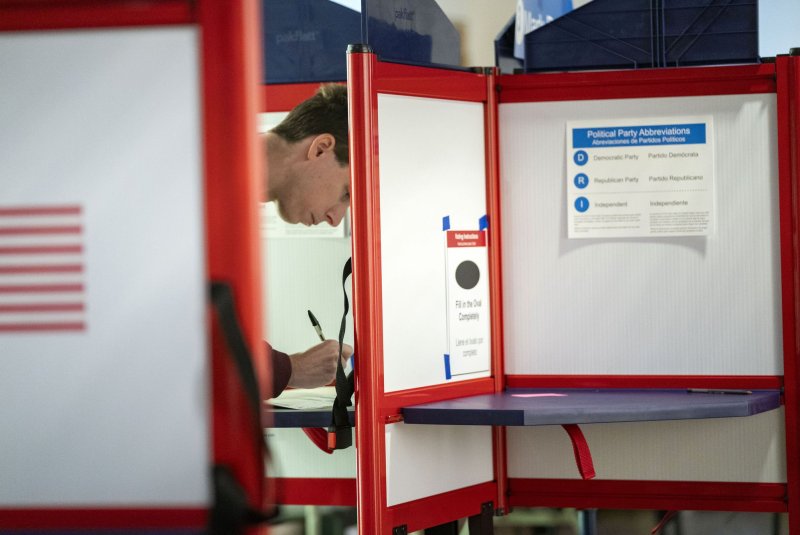A Virginia resident fills in his ballot on Election Day at the Arlington Contemporary Arts Center in Arlington, Va., on Nov. 7, 2023. File Photo by Bonnie Cash/UPI |
License PhotoNov. 5 (UPI) — Eight states voted on Tuesday to amend their constitutions to prohibit the voting of noncitizens in state and municipal elections.
Idaho, Iowa, Kentucky, Missouri, North Carolina, Oklahoma, South Carolina and Wisconsin all passed measures on the ballot for these amendments. Each was brought forth by their respective state legislatures, all with Republican majorities.
The language of the amendments varies slightly but the outcome is the same: Counties and municipalities in those states will not allow noncitizens to vote in their elections.
Idaho passed the measure 64.8% to 35.2%, according to unofficial state results.
In Iowa, with 97 of 99 counties reporting, the measure was approved with a vote shore of 77%, unofficial state results show.
Kentucky voted 62% in favor of the measure, Missouri nearly 70%, North Carolina 77.6%, Oklahoma passed it by 80.7% and Wisconsin by 71%, according to unofficial results from their individual election commissions.
It is currently legal for noncitizens to vote in some local elections in at least 17 cities across the United States, including San Francisco and Oakland, Calif., several cities in Maryland and Vermont and the District of Columbia. Noncitizen voting is not legal in any of the states that have measures on the ballot.
It is illegal for noncitizens to vote in federal elections, such as the presidential election, anywhere in the United States.
Congress instituted penalties for noncitizen voting in federal elections when it passed the Illegal Immigration Reform and Immigrant Responsibility Act in 1996. These penalties include up to five years in federal prison for illegally registering to vote and offenders may face deportation or other consequences related to their immigration status.
Twelve states have already adopted constitutional language to prohibit local governments from allowing noncitizens to vote. North Dakota did so in 2018, followed by Alabama, Colorado and Florida in 2020 and Louisiana and Ohio in 2022.
Support for the amendments
These amendments have reached the ballot in states with Republican-led legislatures, but support from lawmakers has not been uniformly partisan.
Oklahoma moved Question 834 to the ballot without the support of Democrats. In Iowa, Amendment 1 was put on the ballot with Republicans and Democrats voting unanimously in favor of it at the statehouse.
Jack Tomczak, vice president of outreach for Americans for Citizen Voting, told UPI that Republicans tend to show more support for the ballot measures than Democrats, according to polling by his organization. But support from Democrats is also high.
“We do get resistance from Democrats in the legislatures,” he said. “A lot of that has to do, I think, with the national talking points. The polling numbers for supportive Democrats are numbers anyone else would want for their issue from everybody.”
Americans for Citizen Voting is an organization that advocates for prohibitions on noncitizen voting in local elections. Its advocacy efforts include sharing information with states pursuing such legislation and otherwise supporting them.
Rhetoric, disinformation creates confusion
Opponents of the state constitutional amendments prohibiting noncitizen voting say it is an unnecessary measure that plays into rhetoric about voter fraud.
The ballot measures to ban noncitizen voting come at a time when rhetoric about illegal voting and election integrity are again at a high point.
Former President Donald Trump has spearheaded a disinformation campaign to sow doubt about the results of the election ahead of Election Day, claiming repeatedly without evidence that voter fraud by undocumented migrants is a widespread problem.
In reality, illegal noncitizen voting is very uncommon. A study by the Brennan Center for Justice, a nonprofit law and public policy organization at New York University, found that illegal noncitizen votes accounted for about 0.0001% of all votes in the 2016 election.
Research by the Heritage Foundation, the conservative organization behind the inflammatory Project 2025, found just 25 instances of “nonresident” voting and 98 instances of “alien” voting across the United States since 1982.
“It is extremely uncommon for noncitizens to cast votes in the United States,” Will Adler, associate director of the Bipartisan Policy Center’s Elections Project, told UPI. “The penalties are so severe that most people believe those penalties serve as an effective deterrent. Why would a noncitizen risk violating federal law and risk being deported to cast a single vote in a federal election.”
Twelve states have already adopted amendments to codify the right to vote in any election for U.S. citizens only.
Tomczak said that his organization is generally supportive of the legislation introduced in the U.S. House by Rep. Chip Roy, R-Texas, the Safeguard American Voter Eligibility Act. However, his organization’s effort to prohibit legal noncitizen voting in local elections is too often miscategorized with efforts to stop illegal voting by undocumented immigrants. He emphasizes that it is important to distinguish these as separate issues.
“Nobody is more frustrated by the confusion between illegal noncitizen voting in state and local elections and legal noncitizen voting than us,” Tomczak said. “It muddies the waters. I’ve been working in politics for almost 30 years. Winning elections is nice. My goal is to make sure people understand what they’re voting on.”

